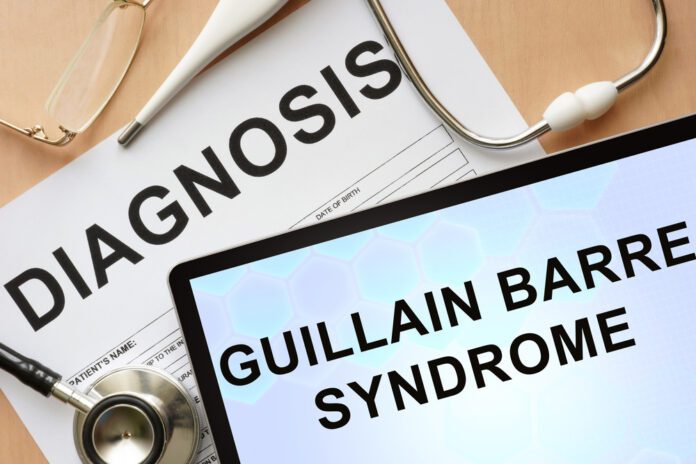Overview Of Guillain-Barré Syndrome (GBS)
Guillain-Barré Syndrome (GBS) is a serious health problem that occurs when the body’s defense (immune) system mistakenly attacks part of the peripheral nervous system. This leads to nerve inflammation that causes muscle weakness or paralysis and other symptoms.
Commonly Associated With
GBS; Landry-Guillain-Barré syndrome; Acute idiopathic polyneuritis; Infectious polyneuritis; Acute inflammatory polyneuropathy; Acute inflammatory demyelinating polyradiculoneuropathy; Ascending paralysis
Causes Of Guillain-Barré Syndrome (GBS)
The exact cause of GBS is unknown. It is thought that GBS is an autoimmune disorder. With an autoimmune disorder, the body’s immune system attacks itself by mistake. GBS can occur at any age. It is most common in people between the ages of 30 and 50.
GBS may occur with infections from viruses or bacteria, such as:
- Influenza
- Some gastrointestinal illnesses
- Mycoplasma pneumonia
- HIV, the virus that causes HIV/AIDS (very rare)
- Herpes simplex
- Mononucleosis
GBS may also occur with other medical conditions, such as:
- Systemic lupus erythematosus
- Hodgkin disease
- After surgery
- GBS damages parts of nerves. This nerve damage causes tingling, muscle weakness, loss of balance, and paralysis. GBS most often affects the nerve covering (myelin sheath). This damage is called demyelination. It causes nerve signals to move more slowly. Damage to other parts of the nerve can cause the nerve to stop working.
Symptoms Of Guillain-Barré Syndrome (GBS)
Symptoms of GBS can get worse quickly. It may take only a few hours for the most severe symptoms to appear. But weakness that increases over several days is also common.
Muscle weakness or loss of muscle function (paralysis) affects both sides of the body. In most cases, the muscle weakness starts in the legs and spreads to the arms. This is called ascending paralysis.
If the inflammation affects the nerves of the chest and diaphragm (the large muscle under your lungs that helps you breathe) and those muscles are weak, you may need breathing assistance.
Other typical signs and symptoms of GBS include:
- Loss of tendon reflexes in the arms and legs
- Tingling or numbness (mild loss of sensation)
- Muscle tenderness or pain (maybe a cramp-like pain)
- Uncoordinated movement (cannot walk without help)
- Low blood pressure or poor blood pressure control
- Abnormal heart rate
Other symptoms may include:
- Blurred vision and double vision
- Clumsiness and falling
- Difficulty moving face muscles
- Muscle contractions
- Feeling the heartbeat (palpitations)
Emergency symptoms (seek medical help right away):
- Breathing temporarily stops
- Cannot take a deep breath
- Difficulty breathing
- Difficulty swallowing
- Drooling
- Fainting
- Feeling light-headed when standing
Exams & Tests
A history of increasing muscle weakness and paralysis may be a sign of GBS, especially if there was a recent illness.
A medical exam may show muscle weakness. There may also be problems with blood pressure and heart rate. These are functions that are controlled automatically by the nervous system. The exam may also show that reflexes such as the ankle or knee jerk are decreased or missing.
There may be signs of decreased breathing caused by paralysis of the breathing muscles.
The following tests may be done:
- Cerebrospinal fluid sample (spinal tap)
- ECG to check the electrical activity in the heart
- Electromyography (EMG) to test the electrical activity in muscles
- Nerve conduction velocity test to test how fast electrical signals move through a nerve
- Pulmonary function tests to measure breathing and how well the lungs are functioning
Treatment Of Guillain-Barré Syndrome (GBS)
There is no cure for GBS. Treatment is aimed at reducing symptoms, treating complications, and speeding up recovery.
In the early stages of the illness, a treatment called apheresis or plasmapheresis may be given. It involves removing or blocking the proteins, called antibodies, which attack the nerve cells. Another treatment is intravenous immunoglobulin (IVIg). Both treatments lead to faster improvement, and both are equally effective. But there is no advantage to using both treatments at the same time. Other treatments help reduce inflammation.
When symptoms are severe, treatment in the hospital will be needed. Breathing support will likely be given.
Other treatments in the hospital focus on preventing complications. These may include:
- Blood thinners to prevent blood clots
- Breathing support or a breathing tube and ventilator, if the diaphragm is weak
- Pain medicines or other medicines to treat pain
- Proper body positioning or a feeding tube to prevent choking during feeding, if the muscles used for swallowing are weak
- Physical therapy to help keep joints and muscles healthy



